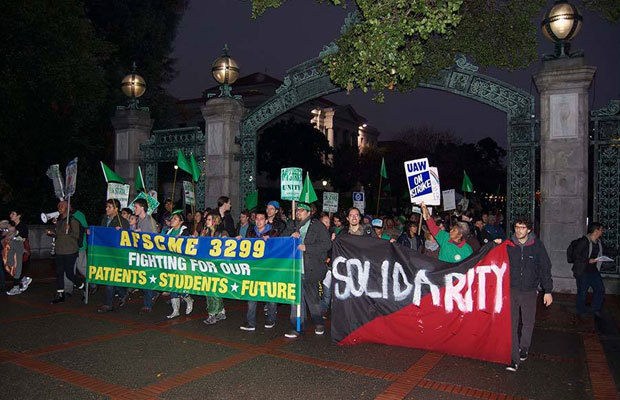Strike could transform UC’s relationship with workers, unions

BY KIMBERLY VEKLEROV
Thousands of union workers protested Wednesday at nine campuses and five hospitals across the University of California, injecting new energy into an ongoing labor dispute and fueling disagreement about what the university’s relationship with its workers should look like.
The American Federation of State, County and Municipal Employees Local 3299 — which represents service and patient-care workers — called for the strike to protest claims of intimidation and threats against employees during a May strike, which the university called “preposterous” and “disingenuous” in a formal response. Graduate student members of United Auto Workers Local 2865 joined the protesters in solidarity.
“Our employees are treated as second class,” said AFSCME 3299 spokesperson Todd Stenhouse. “They are literally held to a different standard of respect and dignity than other UC workers.”
On campus, protesters — many of whom are custodians and food-service workers — were out in force before sunrise and stayed until about 10 p.m. The unions held similar protests across the UC system at almost every campus, including UCSF. UC Merced was the only campus that did not participate, according to Stenhouse.
An unknown number of graduate students canceled classes at UC Berkeley. While many undergraduate students chose to protest alongside university employees, a sizable number were confused at the cause of the commotion, eagerly pulling out smartphones to capture the crowds of picketers.
The university estimates Wednesday’s strikes cost about $10 million, according to UC spokesperson Dianne Klein.
Alexander Coward, a lecturer who teaches Math 1A, sent a long email to his students explaining why he would not cancel his discussion sections for the day, despite two of his graduate student instructors choosing to participate in the strike.
The email was later posted on Reddit. Subsequently, the email’s content was disseminated through various social media platforms.
Coward chose to teach the sections that would have otherwise been led by graduate student instructors, saying students’ education should not be impacted by the complex workings of labor-management issues.
At UC Santa Cruz, protesters blocked nearly all entrances to the campus, and almost every class was canceled.
According to UC Davis spokesperson Keith Sterling, about 200 food-service workers at UC Davis participated in the strikes. The campus planned alternative arrangements so dining halls and cafeterias were not negatively impacted.
UCLA hired approximately 325 replacement workers to staff various medical facilities, according to Roxanne Moster, a spokesperson for the UCLA health system. Twenty percent of elective surgeries scheduled for Wednesday were canceled at UCLA, according to Klein.
For student organizers of the International Transgender Day of Remembrance, the strike inconveniently coincided with their events. In an open letter, a group of UC Berkeley students wrote that although they stood in solidarity with protesters, they wanted to “build an intersectional and inclusive movement.”
Benji Delgadillo, one of the letter’s authors, said the strike diverted attention from issues facing transgender people.
“Probably the biggest impact (of the strikes) was the message not to go to campus, not to cross picket lines,” Delgadillo said.
Stenhouse called his union a “steadfast advocate of equality.” Despite wanting to “honor our trans brothers and sisters,” Stenhouse said, the process for choosing the strike date was lengthy and involved many factors.
In a Thursday statement, Dwaine Duckett, the university’s vice president of human resources, that the next round of bargaining meetings between the UC system and AFSCME 3299 are scheduled for Dec. 11 to 12 and Dec. 17 to 18.
Duckett implored union negotiators to demonstrate the same level of flexibility as the university has shown.
[Source]: The Daily Californian


